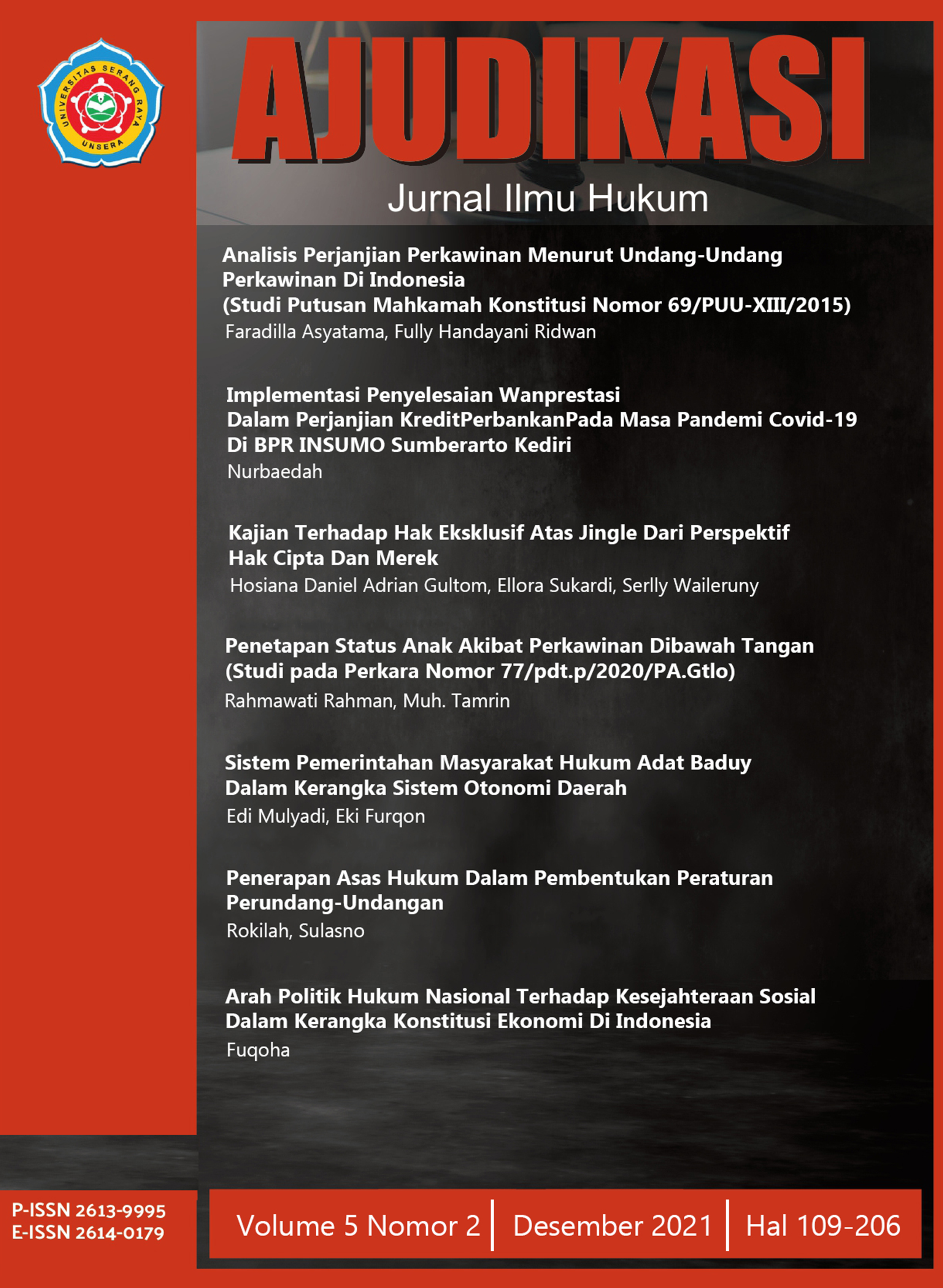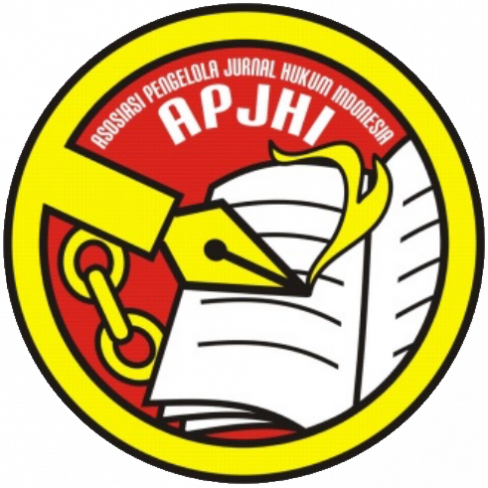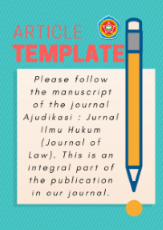Arah Politik Hukum Nasional Terhadap Kesejahteraan Sosial Dalam Kerangka Konstitusi Ekonomi Di Indonesia
DOI:
https://doi.org/10.30656/ajudikasi.v5i2.4203Keywords:
Constitution, Economy, Welfare, Politics of LawAbstract
Economic constitution has become a new idea within the constitutional framework as the basic foundation for the development of the national and global economy. National economic policies in the context of realizing social welfare must be able to guard and control the national economic system. Apart from the legal politics policy and the government's power in determining the direction of national policy, the conception of the economic constitution as the basic foundation must be realized. This study intends to describe the politics of national law and the concept of economic constitution in realizing social welfare. This research method uses normative juridical research using an exploratory descriptive analytical approach. The characteristics of national legal politics in practice still influence the realization of national economic policies, even though it has implied the concept of an economic constitution in the 1945 constitution. Social welfare, which is the goal of the state, becomes a political tool for national law through a national economic system that cannot be separated from political power.
Downloads
References
Asshiddiqie, Jimly. “Konstitusi Ekonomi (Ekonomi Pasar, Demokrasi Dan Konstitusi).†jimly.com, 2018. http://www.jimly.com/makalah/namafile/164/Pengantar_Ekonomi_Konstitusi.pdf.
———. “Memperkenalkan Gagasan Konstitusi Ekonomi.†Jurnal Hukum Prioris Vol. 3, No. 2 (2013): 1–26. https://www.trijurnal.lemlit.trisakti.ac.id/prioris/article/view/360/330.
Asshidiqie, Jimly. Hukum Tata Negara Dan Pilar-Pilar Demokrasi. Ed. Ke-2. Jakarta: Sinar Grafika, 2012.
Budiardjo, Miriam. Dasar-Dasar Ilmu Politik. Revisi. Jakarta: Gramedia Pustaka Utama, 2008.
Creswell, John W. Research Design, Pendekatan Kualitatif, Kuantitatif Dan Mixed. Third Ed. Yogyakarta: Pustaka Pelajar, 2015.
Harvelian, Agnes. “Mahkamah Konstitusi Dan Penguatan Konstitusi Ekonomi Indonesia.†Jurnal Konstitusi Vol. 13, No. 3 (2016): 530. https://doi.org/10.31078/jk1333.
Ismatullah, Deddy, and Enung Nurjanah. Politik Hukum, Kajian Hukum Tata Negara. Cet. Ke-1. Bandung: Remaja Rosdakarya, 2018.
Jaya, Bergas Prana. Dasar-Dasar Pengantar Ilmu Hukum. Cet. Ke-1. Yogyakarta: Legality, 2019.
Kaelola, Akbar. Kamus Istilah Politik Kontemporer. Cet. Ke-1. Yogyakarta: Cakrawala, 2009.
Mahfud MD, Moh. Membangun Politik Hukum, Menegakkan Konstitusi. Cet. Ke-4. Depok: Raja Grafindo Persada, 2017.
———. Politik Hukum Di Indonesia. Cet. Ke-4. Jakarta: Rajawali Press, 2011.
Maksudi, Beddy Iriawan. Sistem Politik Indonesia : Pemahaman Secara Teoretik Dan Empirik. 1st ed. Jakarta: Rajawali Press, 2013.
Purbacaraka, Purnadi, and M. Chidir Ali. Disiplin Hukum. Bandung: Citra Aditya Bakti, 1990.
Soekanto, Soerjono, and Sri Mamudji. Penelitian Hukum Normatif. Jakarta: Rajawali Press, 2006.
Sudjana, Eggi. Islam Fungsional. Ed.1. Jakarta: Rajawali, 2008.
Sudrajat, Suryana, and Abdul Malik, eds. Negara Darurat Etika. Cet. Ke-1. Serang: Serabook, 2018.
Syaukani, Imam, and A. Ahsin Thohari. Dasar-Dasar Politik Hukum. Cet. Ke-11. Depok: Rajawali Press, 2018.
Wahidin, Samsul. Politik Penegakan Hukum Di Indonesia. Cet. Ke-1. Yogyakarta: Pustaka Pelajar, 2017.
Downloads
Published
Issue
Section
License
Authors who publish with this journal agree to the following terms:
Authors retain copyright and grant the journal right of first publication with the work simultaneously licensed under a Creative Commons Attribution License that allows others to share the work with an acknowledgment of the work's authorship and initial publication in this journal.
Authors can enter into separate, additional contractual arrangements for the non-exclusive distribution of the journal's published version of the work (e.g., post it to an institutional repository or publish it in a book) with an acknowledgment of its initial publication in this journal.
Authors are permitted and encouraged to post their work online (e.g., in institutional repositories or on their website) before and during the submission process, as it can lead to productive exchanges and earlier and greater citation of published work.
All articles in Ajudikasi : Jurnal Ilmu Hukum can be disseminated provided they include the identity of the article and the source of the article (Ajudikasi : Jurnal Ilmu Hukum). The publisher is not responsible for the contents of the article. The content of the article is the sole responsibility of the author
Ajudikasi : Jurnal Ilmu Hukum is lincensed under a Creative Commons Attribution-ShareAlike 4.0 International License.










1.png)
.png)
.png)





.png)
.png)
.png)
.png)





.png)







